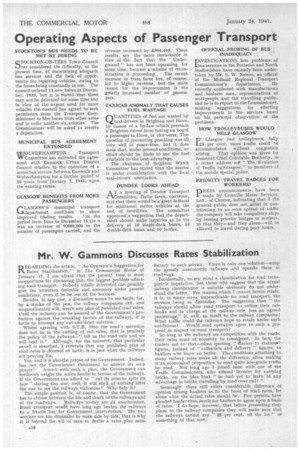Mr. W. Gammons Discusses Rates Stabilization
Page 20

If you've noticed an error in this article please click here to report it so we can fix it.
REGARDING the article, " An Operator's Suggestion for Rates Stabilization," in The Commercial Motor of January 17, I am afraid that the present time is most inopportune for discussing this, the biggest problem affecting road transport. Nobody vitally interested can possibly give the attention desirable and necessary under present conditions, even if he be out of the Services.
Besides, in any case, a discussion seems to me futile, for, by a stroke of the pen, the railway companies can, and unquestionably will, wreck any plan of published road rates. Until the industry can be assured of the Government's protection against the wrecking tactics of the railways, it is futile to attempt any cut-and-dried solution.
Whilst agreeing with S.T.R. that the road's salvation does not lie in the cutting of rail rates, that is precisely the policy of the railways—" tell us the road rate and we will beat it." Although, for the moment, that particular sword is sheathed, I reiterate that any published plan of road rates is doomed at birth; it is just what' the railways are praying for.
Yes, and it is also the prayer of the Government. Indeed, has not the Government threatened to answer its own prayer? Armed with such a plan, the Government' can forthwith weight the scales finally in favour of the rai1wa.s. If the Government can afford to "cut its nose to spite its face " during this war, well, it will stick at nothing after the war to see the railways victorious! Why help it?
The simple position is, of course, that the Government has to choose between the life and death of the railways and of the roadways. Railways to-day, are an anachronism. Road transport would have long ago beaten the 'railways to a frazile but for Government intervention. The two services are too dissimilar to work side by side; that is why it is beyond the wit of man to devise a rates plan satis factory to each service. There is only one solution—scrap the grossly uneconomic railways and operate them as roadways.
Incidentally, to, my mind a classification for road transport•sis imperative, but those who suggest that the actual railway classification is suitable obviously do not understand the latter. For reasons which I cannot herein relate, it is, in many ways, impracticable for road transport, the services being so dissimilar. The suggestion that "the railways should allow road transport to utilize their rate books and to charge at the railway rate, less an agreed percentage," is, well, an insult to the railway companies! What traffic could the railways hope to retain under such conditions? Would road operators agree to such a proposal in respect of road transport?
So long as the railways are competitive with the roads, their rates must of necessity be considered. In fact, the traders see to that—often quoting " gtation ta station*" figures, instead of "collection and delivery" figures, to hauliers who know no better. The conditions attaching to many railway rates make all the difference, often making it an economical proposition to send quite low-grade traffic by road. Not long ago I Joined issue with one of the Traffic Commissioners, who refused licences for carrying bricks, on the plea that "he had yet to learn of any advantage in bricks travelling by road over rail ! "
Seemingly, there still exists considerable difference of opinion among hauliers as to the basis of road rates, let alone what the actual rates should be. Few persons have pleaded harder than myelf for hauliers to agree upon a basis of rates. I do hope, however, that before presenting their plans to the railway companies they will make sure that the railways cannot say " 25 per cent, off the lot " or something of that sort.




















































